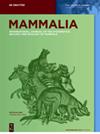Morphological symmetry of Rhipidomys mastacalis (Mammalia, Rodentia, Cricetidae) in fragmented habitats of the Atlantic Forest in Northeastern Brazil: a study on the influence of the environment on an endemic species
IF 0.8
4区 生物学
Q3 ZOOLOGY
引用次数: 0
Abstract
The Brazilian Atlantic Forest has undergone significant transformation, resulting in habitat loss and the endangerment of many species of mammals and other vertebrates. In this study, the presence of fluctuating asymmetry of four anatomical structures of the arboreal rodent巴西东北部大西洋森林支离破碎的栖息地中 Rhipidomys mastacalis(哺乳纲,啮齿目,鼬科)的形态对称性:关于环境对特有物种影响的研究
巴西大西洋森林经历了巨大的变化,导致栖息地丧失,许多哺乳动物和其他脊椎动物濒临灭绝。在这项研究中,使用几何形态计量学评估了树栖啮齿动物 Rhipidomys mastacalis 的四个解剖结构是否存在不对称波动。研究的重点是在由森林植被、森林地区的占地镶嵌和可可种植园组成的植被镶嵌中采集的成年标本。结果显示,所有结构和所有区域的波动不对称值都很大。在森林植被和可可种植园中,头骨和肩胛骨的不对称值最高,而在森林植被中,下颌骨的不对称值最高,在占位镶嵌和可可种植园中,骨盆的不对称值最高。这些发现与之前评估哺乳动物发育稳定性的研究结果一致,并表明高不对称值表明对本体发育的不同阶段有影响,这可能会损害一个物种后代的生存。总之,这项研究为了解栖息地破碎化对乳鼠的影响提供了重要见解,并强调了保护巴西大西洋森林及其多种野生动物完整性的必要性。
本文章由计算机程序翻译,如有差异,请以英文原文为准。
求助全文
约1分钟内获得全文
求助全文
来源期刊

Mammalia
生物-动物学
CiteScore
2.20
自引率
10.00%
发文量
68
审稿时长
6-12 weeks
期刊介绍:
Mammalia is an international, multidisciplinary, bimonthly journal devoted to the inventory, analysis and interpretation of mammalian diversity. It publishes original results on all aspects of the systematics and biology of mammals with a strong focus on ecology, including biodiversity analyses, distribution habitats, diet, predator-prey relationships, competition, community analyses and conservation of mammals. The journal also accepts submissions on sub-fossil or recently extinct mammals.
 求助内容:
求助内容: 应助结果提醒方式:
应助结果提醒方式:


